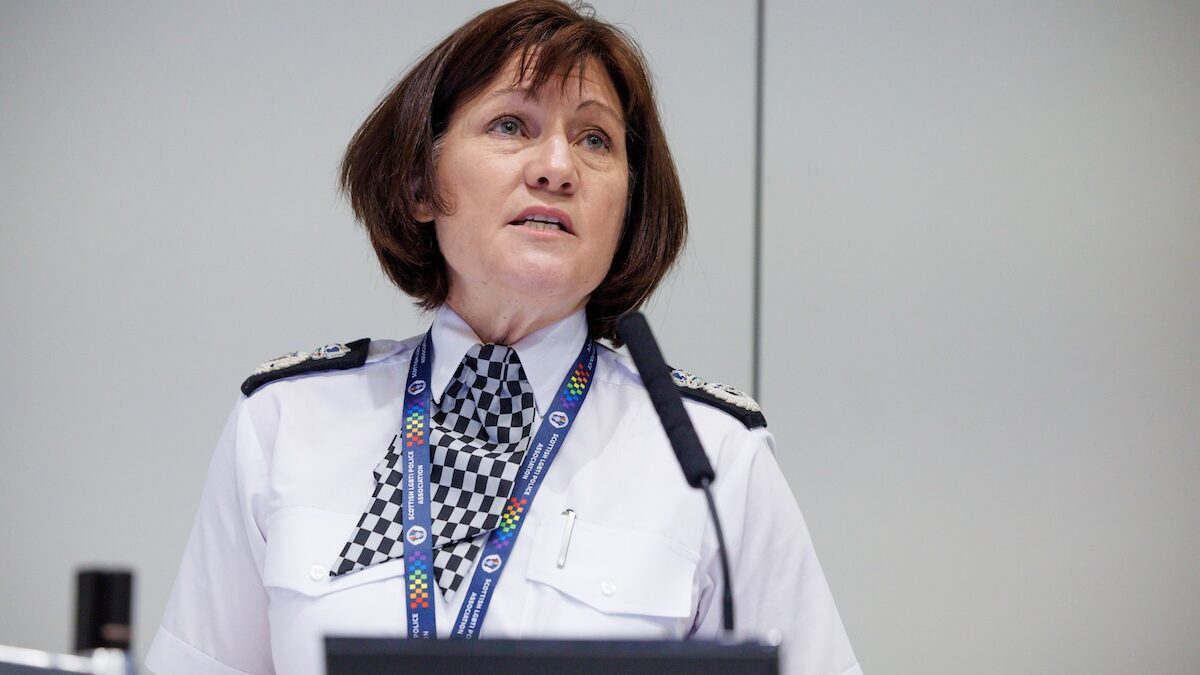Scotland’s chief constable has outlined a broader role for technology in policing as she pointed to a justice system choked by delays.
Jo Farrell, who runs the national force, said she wants to drive improvements to a system that sees over 500 officers per day called to court – with the majority not called to give evidence.
Similarly, she said it takes “far too long” for victims to get justice – and said “criminal justice inefficiencies” are impacting policing operations as well as the wellbeing of staff.
In a speech at Futurescot’s Digital Justice & Policing conference on Tuesday, she said the new digital evidence sharing capability (DESC) programme aims to speed up the justice process.
“I’m passionate about improving criminal justice experiences, outcomes for our victims, our witnesses and police officers and police staff who are key to the system,” she told delegates at Strathclyde University’s Technology & Innovation Centre.
“It’s probably well documented that I think the time it takes for victims to get justice in this system is far too long. Victims, witnesses, including police, are repeatedly cited to court and they don’t give evidence.
“And I’ve also consistently underlined the impact that criminal justice inefficiencies have on Police Scotland’s operational capability, our overtime bill and the wellbeing of our officers.
She added: “There are more than 500 officers called to court on a daily basis, and only a very small proportion actually give evidence, so that’s the challenge, and we’re working closely with the court services and the prosecutors and government to use technology to drive improvements.”
The Digital Evidence Sharing Capability (DESC) is a £33 million Scottish Government initiative for sharing digital evidence from crime scene to court room across Scotland.
The programme was launched in July and allows police officers, prosecutors, defence lawyers, court staff and judges to access a secure, unified system to collect, store, process and manage evidence digitally.
Benefits include fewer victims and witnesses having to attend court, reducing the time for cases to come to court and reach conclusion, and saving police time.
During a pilot of the programme in Dundee, around 19,500 pieces of evidence were handled through DESC, with almost 550 hours of police officers’ time freed up. Praising the leadership of local court service staff and the judiciary, the chief constable also credited the pilot with expediting cases more quickly and improving the experience of victims and witnesses, especially in domestic abuse cases.
The platform, delivered by American software house Axon, handles evidence including CCTV footage, photographs, data and other material from computers and mobile devices, with more capabilities set to be added, including police interviews.
“We’re in the process of expanding DESC across all of our areas, and we anticipate full implementation by the autumn of next year,” added Farrell.
The chief also outlined the role for body worn video cameras – with the award of a national contract to Motorola in June, which she said will be linked to DESC and would ultimately help de-accelerate incidents, improve public trust and reduce complaints’.
“I truly believe it will be a game changer,” she said. “But I want to underline the crucial role of commitment, grip, collaboration and leadership, which is required by everybody within the system.
On cybercrime, the chief constable said there was greater investment in digital skills and capabilities, and the Digi Dogs – dogs trained to sniff out digital devices – was enhancing its frontline digital evidence and forensics offer. Additional funding was also made available from the Scottish Government for cryptocurrency investigations.
“Our next steps, in line with the three year plan, will be to deliver the following: a cyber command, which will bring together the various cyber elements from across the organisation into a single department.
“This will professionalise the service, ensure consistency, and will join up investigations with intelligence, digital forensics, public engagement and, importantly, prevention.” The force will also be joining the Home Office’s Fraud and Cyber Crime Reporting and Analysis System (FCCRAS), formerly Action Fraud.
She added: “And we have also set out our intention to develop capabilities surrounding data science, artificial intelligence and analytics, through better use of data analytics, backed up by a commitment to a rights based approach.” Such capabilities will be used to spot patterns in crime reporting, allowing the force to do more “targeted patrols” and boost effectiveness.
Farrell also touched on AI-powered live facial recognition systems. The tech, which has been used by the Met Police and South Wales Police, is not currently in use in Scotland. But is it something supported by the Scottish Biometrics Commissioner, where operational needs arise.
Privacy campaigners have outlined their concerns about the technology in legal cases south of the border. But forces like South Wales have now overcome those challenges, based on using it for highly targeted operations and in pursuit public safety goals.
Farrell hinted at a similar approach. She said: “At Scotland’s first biometrics conference in June, we took the first step into the potentially difficult and divisive topic of live facial recognition, and we’ve been watching what other police forces are doing and learning from them. Live facial recognition may help us keep people safe and communities safer, but we need to start that conversation and listen to public’s views and concerns on this we’re currently considering how we intend to consult and engage on this issue.”




